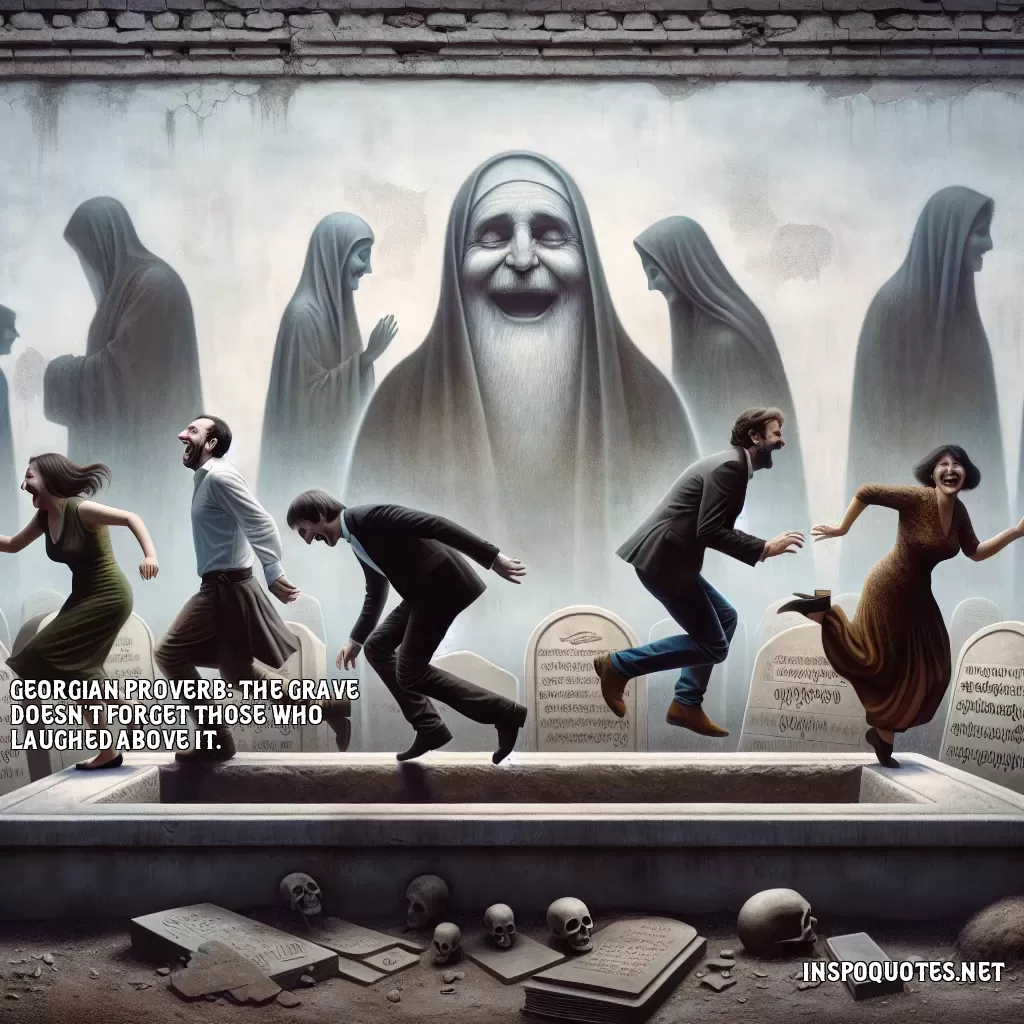
Georgian Proverb: The grave doesn't forget those who laughed above it.
Author: Georgian Proverb
👁️ 2 views

Georgian Proverb: The grave doesn't forget those who laughed above it.
👁️ 2 views
The Georgian proverb, "The grave doesn't forget those who laughed above it," conveys a profound message about respect, remembrance, and the impermanence of life. On the surface, it speaks to the notion that our actions and attitudes towards death and the deceased have lasting consequences. The imagery of the grave as an entity that does not forget implies that disrespect shown towards death or the deceased is not simply erased with time, but rather resonates as a mark of one's character. The proverb could be interpreted as a cautionary reminder of the importance of humility and respect when confronting mortality. Those who approach death with irreverence or who trivialize the gravity of passing may find that their actions echo back to them, either within their own conscience or legacy. It suggests that mocking or laughing in the face of death is not without repercussions, as such behavior may linger as a negative memory or judgement in the societal or familial narrative. Furthermore, the proverb emphasizes the idea that human actions are significant and have an enduring impact. It warns against hubris and suggests that life should be approached with a sense of reverence and understanding of its finite nature. In a broader sense, it might also reflect the importance that Georgian culture, like many others, places on honoring ancestors and maintaining a respectful relationship with those who have passed on.
Quote By: Georgian Proverb
**The Timeless Wisdom of Georgian Proverbs**
Georgian proverbs serve as a rich tapestry of the country's culture, history, and collective wisdom. These aphorisms, which have been passed down through generations, encapsulate the values, philosophy, and everyday experiences of the Georgian people. Known for their poetic structure and profound insight, Georgian proverbs often reflect the importance of family, community, and personal integrity.
The origins of Georgian proverbs can be traced back centuries, deeply rooted in the nation’s oral traditions. They have been used in various contexts, from religious teachings to everyday conversation, providing guidance and caution. Authors and scholars of Georgian literature, such as the notable poet and thinker Shota Rustaveli, have drawn inspiration from these pithy sayings, highlighting their impact on Georgian literature and culture. Rustaveli’s masterpiece, “The Knight in the Panther’s Skin,” often echoes the wisdom found in proverbs, reinforcing their significance in conveying moral lessons and social norms.
Georgian proverbs are not merely linguistic curiosities; they are reflections of the Georgian way of life. For instance, the proverb "A friend in need is a friend indeed" resonates with the communal spirit that underpins Georgian society. This saying underscores the value placed on friendship and loyalty, illustrating how proverbs serve as reminders of important social bonds. Similarly, another proverb, "He who does not work, does not eat," emphasizes the connection between hard work and sustenance, a principle that has guided generations in their pursuit of livelihood.
Today, Georgian proverbs continue to be relevant. Authors and educators use them to teach younger generations about their heritage, instilling a sense of identity and pride. The wisdom encapsulated in these proverbs offers timeless insights that resonate beyond the borders of Georgia, appealing to universal themes of human experience. By preserving and promoting these sayings, contemporary Georgian authors ensure that this rich tradition continues to thrive, allowing the voices of the past to guide the present and inspire the future.
In the ever-evolving landscape of modern Georgia, proverbs remain a cherished aspect of its vibrant culture, illustrating the depth of understanding and life experience that characterizes this historic nation.